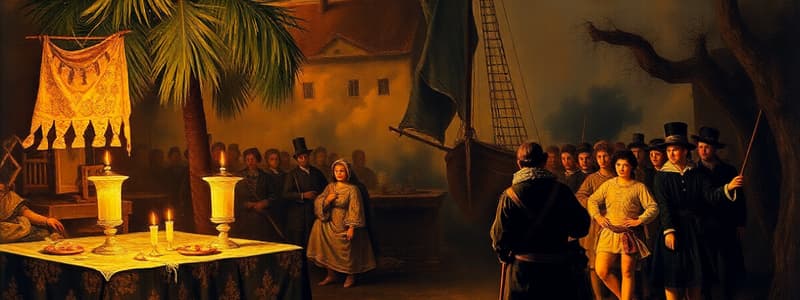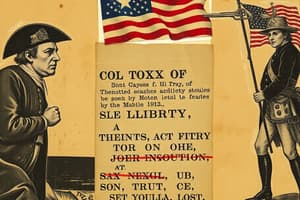Podcast
Questions and Answers
What was the colonists' main argument against the British government's right to impose taxes?
What was the colonists' main argument against the British government's right to impose taxes?
- The colonists had no representation in British Parliament. (correct)
- The colonists believed they should be taxed only by their colonial governments.
- The colonists believed the British government did not have the right to impose taxes on goods produced in the colonies.
- The colonists believed the British government was corrupt and should not be trusted.
Which event directly led to the passage of the Coercive Acts?
Which event directly led to the passage of the Coercive Acts?
- The Sugar Act
- The Stamp Act
- The Boston Tea Party (correct)
- The Boston Massacre
Why might colonists have been upset with the Proclamation Line of 1763?
Why might colonists have been upset with the Proclamation Line of 1763?
- It required colonists to pay for the defense of the western territories.
- It forced colonists to relocate from their existing settlements west of the Appalachians.
- It imposed a tax on all land west of the Appalachian Mountains.
- It limited their access to western lands and expansion. (correct)
Which of these acts was NOT a direct response to the need to pay for the French and Indian War?
Which of these acts was NOT a direct response to the need to pay for the French and Indian War?
What was the significance of the Boston Massacre?
What was the significance of the Boston Massacre?
What was the primary purpose of the Stamp Act?
What was the primary purpose of the Stamp Act?
How did the colonists react to the Townshend Acts?
How did the colonists react to the Townshend Acts?
Which of the following was NOT a consequence of the Coercive Acts?
Which of the following was NOT a consequence of the Coercive Acts?
Flashcards
Proclamation Line
Proclamation Line
British regulation forbidding colonists from settling west of the Appalachian Mountains.
Sugar Act
Sugar Act
A 1764 tax on foreign goods like sugar in the colonies.
No Taxation without Representation
No Taxation without Representation
Colonists' claim that they should not be taxed without having representatives in Parliament.
Stamp Act
Stamp Act
Signup and view all the flashcards
Townshend Act
Townshend Act
Signup and view all the flashcards
Boston Massacre
Boston Massacre
Signup and view all the flashcards
Tea Act
Tea Act
Signup and view all the flashcards
Boston Tea Party
Boston Tea Party
Signup and view all the flashcards
Study Notes
British Actions
- Proclamation Line of 1763: British government prevented colonists from expanding past the Appalachian Mountains.
Taxes to Pay for War
-
Sugar Act (1764): Tax on foreign goods, specifically sugar.
-
Stamp Act (1765): Tax on papers, documents, and playing cards.
-
Townshend Act (1767): Tax on glass, lead, paint, paper, and tea.
-
Tea Act (1773): Tax on tea, further angering colonists.
No Taxation Without Representation
-
British government argued they had the right to tax colonists due to their ultimate control.
-
Colonists countered that they had no representation in Parliament, therefore the British had no right to tax them.
Boston Massacre: 1770
-
Deadly riot in Boston, Massachusetts.
-
Turned public opinion against the British government and towards Revolution.
Boston Tea Party: 1773
- December 16, 1773: Colonists, dressed as Native Americans, dumped British tea into Boston Harbor.
Coercive Acts (Intolerable Acts)
-
Passed in response to the Boston Tea Party.
-
Placed restrictions on Massachusetts' ability to govern itself.
-
Sparked new resistance throughout the colonies.
First Continental Congress: 1774
-
12 of 13 colonies sent representatives to discuss the Intolerable Acts.
-
Sent grievances to the King.
-
Demanded the repeal of the Intolerable Acts, but NOT seeking independence.
Studying That Suits You
Use AI to generate personalized quizzes and flashcards to suit your learning preferences.




